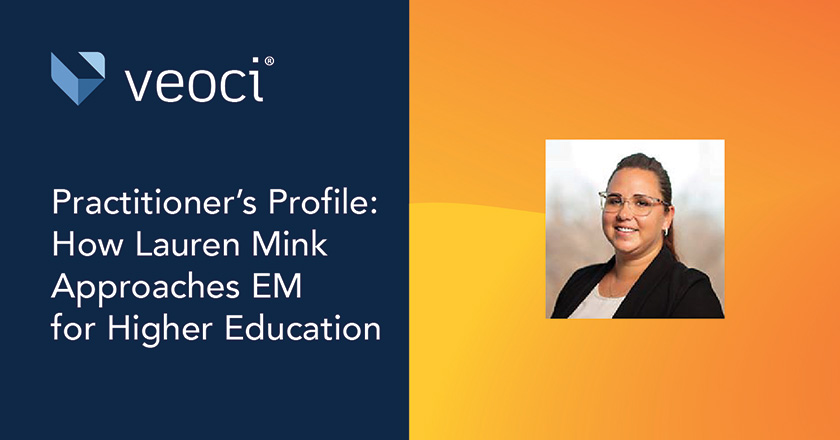For three and half years Lauren created, shaped, and delivered critical crisis management solutions for Veoci’s higher education customers as a Solutions Engineer. Now, she begins a new role as the Product Manager for Veoci’s Higher Education vertical, right off the back of earning the Certified Emergency Manager designation (CEM) through the International Association of Emergency Managers (IAEM).
With her years of experience as an emergency and continuity planner at both the county and university levels, she can continue making an impact on campuses across the country through this role. In her new role, Lauren will continue to serve Veoci’s higher education customers and further enhance current and develop new solutions.
Let’s take a look at Lauren’s background and experiences, and why she chose to take on the responsibilities of any organization’s most important, but often overlooked, positions.
Starting out
Lauren’s first dive into emergency management was in 2009, when she undertook a year-long work-study opportunity under UNC Asheville’s first emergency manager, who was a FEMA alum. As an undergrad, Lauren also studied meteorology, which she says many other emergency management professionals share her passion for. Many are nerds for it, according to Lauren.
Lauren continued to learn about the world of emergency management through independent research and extensive internships at the county and university levels. After graduating, she took her first position at East Carolina University as an Emergency and Continuity Planner.
While meteorology led her to emergency management, Lauren recalls one moment in particular that made her path clear to her. While studying for her undergraduate degree, a professor asked her and her classmates to read The Ravaging Tide by Mike Tidwell, a 2006 book that explores the possibility of other Hurricane Katrina-level events happening in coastal cities due to climate change.
Tidwell’s discussion made Lauren ask herself a new question: What impact does disastrous weather—and other emergency events—have on people? As a meteorology student, the mark high winds and torrential rains have on the landscape and infrastructure were already clear. The human side of the events, however, started to show itself to her thanks to Tidwell’s novel. That human side is where she wanted to make a difference.
Coupled with this question was the realization that she didn’t want to do shift work or be on TV. What Lauren wanted from her education was in-the-field experience, working with other people, and within an active and collaborative environment, which she easily found within emergency management.
Tales from the field
Among Lauren’s favorite career moments (so far) was the 3-day exercise she organized alongside FEMA and the National Weather Service. The exercise included the entirety of the University of North Carolina System, and took 2 years of preparation from all parties involved.
The exercise simulated a category 5 hurricane hitting the state, a reality within arm’s reach. Models of the storm, the surge, and the possible tornadoes stemming from a storm of this magnitude impressed Lauren, especially considering her love for meteorology. 9 months of after-action work followed the exercise as well.
Through this exercise, and her numerous experiences, Lauren took home some important pieces of advice for the future (and other emergency management professionals).
“You don’t want to meet someone the day something happens,” Lauren said. Relationships are paramount to the success of a response. “You want to make sure you exchange business cards and strike ‘mutual aid’ agreements.” By knowing who you’ll be working with, and what they can do to assist you, an emergency manager can ensure some efficiency within the response they put forward.
Understanding the role of an emergency manager during a crisis is another one of Lauren’s big takeaways. Rarely are emergency managers actively in the field during a response. “I like to think of it as being a stage manager for a play or production,” Lauren said. “You want to make sure everything’s in place, that everyone and everything are coordinated beforehand. When that scene finally comes up, you want everything to go off without a hitch.”
But a common theme in emergency management is that things rarely go exactly as plans foretell. Lauren says that the emergency management community in North Carolina has an unofficial motto: “Semper Gumby.” Adaptability, as other Veoci practitioners have echoed, is one of the most valuable skills an emergency manager can have.
Another one of Lauren’s favorite moments also hits on the importance of adaptability. As a crisis management professional, she’s spent time doing business continuity, something she once presented at a conference about. Lauren’s presentation, “The Antidote to Murphy’s Law is BC Planning,” hit on why a plan is important: a plan is a backbone, a guide through what may seem suddenly unnavigable. Even if the unexpected happens, a good plan will be able to steer a team through an event.
Words of advice
For aspiring emergency managers, Lauren had great words of advice as well.
Now, many educational institutions offer programs where students can learn the in-and-outs of emergency management. And while the books are important, the field is equally as important. Many organizations are trying to fill these talent gaps, hence the rise in the availability of accredited programs.
She suggests getting as much experience, through resources like internships, as possible. She also advocates for diversifying that experience; county emergency management has as much nuance as university emergency management, and learning them all will only help aspiring EMs develop professionally.
And just as our other practitioners have said, emergency management is a rewarding practice. For Lauren, she sees it as an outlet for her life-long compassion to help people. Despite how behind-the-scenes it sometimes may be, this practice has very apparent effects. This profession, for Lauren, is also an opportunity to make the place a better place than she found it.
A changing landscape
Nothing comes without challenges. During her time as an emergency management professional, communication always proved to be one of the biggest hurdles.
For public facing responses, sending word to the affected population was trickier than it led on. Lauren found that you have to play all the cards you have to increase exposure— that means utilizing both digital channels, print outlets, and broadcast.
Younger generations source their news from internet outlets and social media, while older generations follow newspapers and broadcasts primarily. Putting something in each channel, and making sure those channel’s respective audience’s received the message, was an act of preparedness. While there’s little that can be done to force people to prepare, providing them the resources was an important, albeit trying, step of the process.
But the traditional trouble of communication was there as well. Phones calls, disparate email chains, texts, and other channels risked some stakeholders in a response missing a crucial message. The common operating picture became muddy for some, and weighed down the response as a result.
Digital solutions, Lauren says, do offer a fix for this obstacle that’s far from exclusive to her experiences. Before using a platform, Lauren said she often felt left out of certain conversations. It was hard to just keep track of the email chains and be caught up.
Platforms coalesce all the information and create a common operating picture, making them very valuable to all of a response’s stakeholders. Lauren said the right platform will bring universal knowledge to a situation, which is always invaluable.
Automation is another significant benefit of these platforms as well. Lauren noticed it just how much time the automation of certain tasks and actions returned to players in a response. It adds to efficiency, something that can’t be discounted.
Conclusion
Emergency management is rewarding for those who are willing to take it on, and Lauren is not an exception to that rule.
Read through the other profiles we’ve put together on Veoci team members by clicking the links below:








